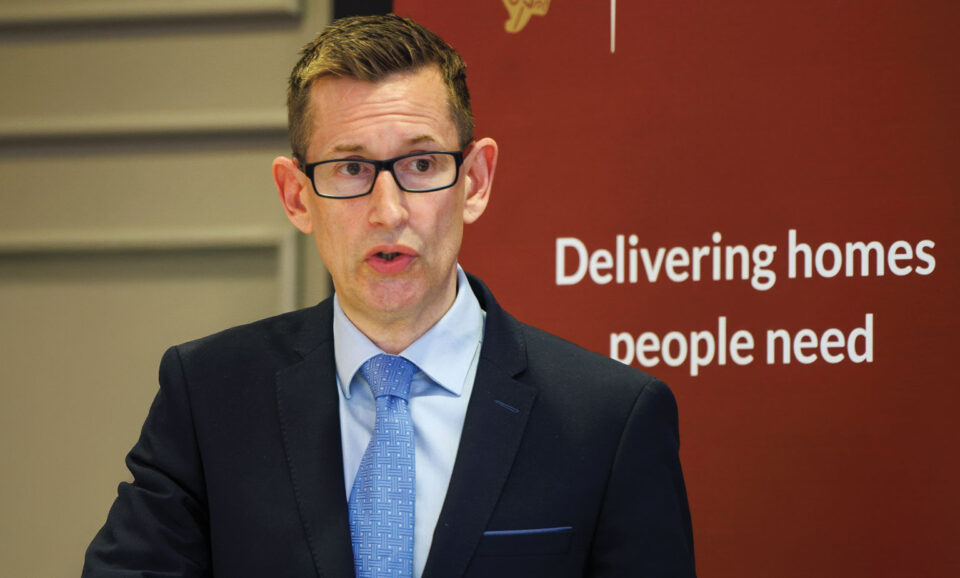
Martin Whelan CEO of The Housing Agency: Making a tangible contribution
1st July 2025
Cover story: Building futures
1st July 2025Challenges abound as government housing policy aims to accelerate delivery

The 2025 Programme for Government (PfG), Securing Ireland’s Future, sets out an approach to housing emphasising the importance of increasing supply, improving affordability, and expanding public housing provision. With the specifics of the next iteration of the Government’s housing plan yet to be published, Ciarán Galway and Joshua Murray reflect on the challenging context of the housing crisis.
The Government has committed to maintaining housing as the central policy priority, with a broad suite of measures aimed at boosting completions, improving rental affordability, and accelerating public housing delivery.
The core ambition of the Government’s housing policy is the delivery of 303,000 new homes by 2030, a target first outlined by the revised National Planning Framework. To reach this goal, annual average delivery is required to rise incrementally from a target of 41,000 in 2025 to 60,000 by 2030, inclusive.
Key commitments in the 2025 PfG include:
- introducing a new, all-of-government national housing plan to succeed Housing for All, underpinned by a multiannual funding commitment;
- Increasing construction capacity to build 303,000 new homes by the end of 2030 as per the revised housing targets;
- investing in a new Towns and Cities Infrastructure Investment Fund;
- further capitalising and enhancing the powers of the LDA;
- retaining and revising the Help to Buy scheme out to 2030;
- expanding the First Home scheme out to 2030;
- “working towards” ending homelessness by 2030; and
- building an average 12,000 new social homes per annum.
The Government has also outlined plans to review the long-term housing targets and associated demand projections. Housing Ireland Magazine understands that a successor strategy to Housing for All is scheduled to be published by September 2025 at the earliest.
“Only a radical reset of housing policy… will deliver at scale the affordable homes that workers and families so desperately need.” Sinn Féin housing spokesperson,
Eoin Ó Broin TD
Despite the Government’s stated focus on increasing supply, delivery levels in recent years continue to fall short of what is needed to meet these targets. The gap between policy ambitions and on-the-ground construction figures remains a significant challenge.
Housing completions: Recent performance
According to the Central Statistics Office (CSO), 30,330 homes were completed in 2024, representing a 6.7 per cent decrease on the 2023 figure of 32,695 completions. The reduction was most notable in apartment deliveries, which fell by 24.1 per cent in 2024 compared to the previous year.
While the original Housing for All target for 2024 was 33,450 homes, this figure was not met, with only 30,330 new dwelling completions recorded by the CSO. In addition, the delivery level was well below the figure of 40,000 new units that was repeatedly referenced by senior government ministers during the 2024 general election campaign.
Now, the Central Bank has forecast housing completions of approximately 32,500 homes in 2025, significantly below the initial government target of 41,000 homes for the year. The new Minister for Housing, James Browne TD, has since described the 41,000 figure as “unrealistic”, and an updated annual target has yet to be confirmed.
The most recent annual dwelling completion figures show that housing output has remained relatively consistent since 2021, but consistently short of the levels now considered necessary to address both existing housing needs and future population growth.
Total dwelling completions in the last five years were as follows:
- 2024: 30,330 completions (against an overall target of 33,450).
- 2023: 32,695 completions (against an overall target of 29,000).
- 2022: 29,851 completions (against an overall target of 24,600).
- 2021: 20,433 completions.
- 2020: 20,676 completions.
Social housing delivery
Figures released in April 2025 also confirmed that the previous government again failed to meet its social housing delivery targets.
In fact, in the last three years, government has consecutively missed its own targets (9,000 in 2022, 11,820 in 2023, and 12,930 in 2024) for social housing delivery.
In 2024, 10,595 social homes were delivered. This figure comprises 7,871 new builds, 1,501 acquisitions, and 1,223 delivered via leasing programmes. In spite of a Housing for All target of 9,300 new build social homes, new build delivery was 15 per cent below this and actually decreased by 3 per cent in 2024 when compared with 2023.
Meanwhile, an additional 1,117 households qualified for social housing support (net need) in 2024 when compared with 2023, bringing the total number of qualified households to 58,824.
In response to the Social Housing Construction Projects Status Report for Q4 2024, published 23 April 2025, Social Democrats’ housing spokesperson, Rory Hearne TD, insisted: “Today’s social housing figures make a mockery of the Government’s claims that it is doing everything it can to solve this worsening crisis.”
In 2023, 11,939 social homes were delivered. This figure incorporates new build units (8,110), acquisitions (1,830), and leasing programmes (1,999). However, as per Housing for All, the projected new build social housing target for 2023 was 9,100, while the overall target was 11,820 social homes (excluding RAS and HAP).
Similarly, in 2022, a total of 10,263 social homes were delivered, of which 7,433 were new builds, 951 were acquisitions, and 1,870 were leased. This total also fell below Housing for All’s target of 9,000 new build social units for 2022, and the overall target of 13,130 social units (excluding RAS and HAP).
Dubious completion projections
The 2024 general election campaign – the result of which saw Fianna Fáil and Fine Gael returned to office – saw housing remain a significant topic of debate. However, the introduction of immigration as a topic of national discourse, alongside the repeated citation of dubious dwelling completion delivery projections by senior government ministers, – both in the run up to, and during, the election campaign – meant that the verbosity with which housing was debated in the 2020 campaign was not repeated in 2024.
In advance, on 25 August 2024, then Taoiseach Simon Harris TD said: “This year [2024], we will exceed our housing targets with almost 40,000 homes built.”
Subsequently, on 24 October 2024, then-Housing Minister Darragh O’Brien TD responded to a question addressed to him in the Dáil by Sinn Féin’s Eoin Ó Broin TD saying: “I still confidently predict – the Deputy and his colleagues in Sinn Féin will be disappointed – that it will be in the high 30,000s to low 40,000s this year.” The official Housing for All target at that point was 33,450 homes.
Then on 11 November 2024, O’Brien posted on X (Twitter): “Housing delivery has risen from 20,000 in 2020 approaching 40,000 homes this year.” On the following day, then-Finance Minister Jack Chambers TD stated in a television debate: “This year we’ll have over 35,000 homes being built.”
However, on 6 November 2024, an internal Department of Finance briefing, Monthly Housing Update November 2024, circulated to Minister Chambers, indicated that housing completions for the year were expected to be similar to or slightly lower than the 32,695 completions achieved in 2023. The document, later released under the Freedom of Information Act, said that completions were broadly aligned with the Central Bank’s revised forecasts.
The general election was held on 29 November 2024, with the two main parties in the then-triparty coalition returned to office just two seats short of an overall majority in the Dáil.
When the CSO released its final dwelling completions data for 2024 in January 2025, it confirmed that only 30,330 homes had been completed in the year, significantly below the figures cited during the election campaign.
Following the publication of the final figures, Sinn Féin leader Mary Lou McDonald TD, speaking in Leaders’ Questions in the Dáil on 5 February 2025, described the Government’s projection of 40,000 homes as an attempt to mislead the public.
Taoiseach Micheál Martin TD responded that the statements made during the campaign were based on “a genuine belief that we were heading for the high thirty-thousands”. He said: “There was no attempt to mislead anybody in that regard. We got the figure wrong in terms of what we thought might happen. The target was 33,000 [sic]. We thought it would be much higher than that. I regret that.”
Tánaiste Simon Harris TD was asked on RTÉ’s Claire Byrne Live on 7 February 2025 whether the 40,000-figure had “misled the public”. He said: “You can only mislead people if you provide information to the public that you know to be untrue.” He acknowledged, however, that the figure should not have been provided to the coalition leaders in August 2024: “I think that is true that they should not have given the figure.”
Harris added that the projection had been provided in good faith, based on projections and analysis from Deutsche Bank, EY, and Cairn Homes.
New Minister for Housing
Appointed as Minister for Housing, Local Government and Heritage in late January 2025, James Browne TD’s first public address to the housing sector occurred at the Housing Ireland conference in March 2025.
Commenting on the decrease in new home completions in 2024, the Minister said that while it was “certainly disappointing”, he remains “optimistic that the building blocks we have put in place will bear fruit”.
“All of our efforts must now focus on building on the platform provided by Housing for All to achieve the target set out in the PfG, of delivering more than 300,000 new homes by 2030,” he added.
In his address, Browne emphasised the scale of the housing challenge and asserted that “a radical step change in housing supply is required”. Qualifying this with remarks about the progress made since the launch of Housing for All, he stresses the introduction of “considerable levels of collaboration and joined-up thinking across key government departments, and with our delivery partners and sectoral stakeholders”.
Housing for All 2.0
As per the PfG, government has committed to publishing “a new, all-of-government national housing plan” as a successor to Housing for All, and underpinned by a multiannual funding commitment.
While the new plan is promised to be “radical and realistic”, and aims to “get more homes built”, government has pledged its commitment to continue placing “special emphasis on supporting home ownership”.
Meanwhile, speaking with Housing Ireland Magazine and reflecting on the Report of The Housing Commission one year on from its publication in May 2024, new CEO of The Housing Agency, Martin Whelan reveals that “many of the tenets underpinning the report are already factored into the new housing plan”.
“The Housing Agency has carried out an analysis of 23 priority recommendations contained within the report – as prioritised by the Department of Housing, Local Government and Heritage – and we have provided a perspective on those and will continue this engagement,” he says.
“It is an iterative process. It is not the case that the execution or implementation of these priority recommendations is waiting some finite date in the future. Our analysis is now complete and is very much part of the policy formulation process in relation to the new plan.”
Initially anticipated to be published in July 2025, the Government’s updated housing plan, will not be published before September 2029.
Discussing the Report of The Housing Commission, Minister Browne acknowledges that while “there is much to be considered” and that implementation could be complex, “I can confidently say we are scoping and progressing many of the actions”. While some actions are committed to in the PfG, the Minister indicates that others are “informing our thinking on the step-change needed to build on Housing for All”.
The new national housing plan, the Minister says, will “provide policy stability and clarity on where we are going and what we are trying to achieve”.
“The plan will be underpinned by multiannual funding to provide certainty and our steadfast commitment to delivery,” he affirms.
Analysis
The 2025 PfG continues to emphasise housing supply as the central priority, and the Government has reaffirmed its commitment to the 303,000-home target by 2030. However, sectoral experts, including the Central Bank, continue to forecast housing completions well below the levels required to meet this target within the planned timeframe.
In fact, the Central Bank has projected just 32,500 new build completions by the end of 2025.
When examining government’s preferred metric for tracking residential construction – commencement notices – it becomes clear that challenges are mounting. According to the latest CSO figures, in each month of 2025 to date (up to and including May at the time of print), there has been a significant decrease in the total number of residential units commenced when compared with 2024. Commencements decreased by:
- 65 per cent in January 2025 compared with January 2024;
- 73 per cent in February 2025 compared with February 2024;
- 85 per cent in March 2025 compared with March 2024;
- 95 per cent in April 2025 compared with April 2024; and
- 53 per cent in May 2025 compared with May 2024.
Excluding May 2020, given the Covid-19 pandemic, the commencements figure for May 2025 (1,024) is the lowest number of commencements since 2015.
Deputy Hearne remarks: “While commencement data is not directly indicative of how many homes will be built, it gives a clear picture of the pipeline of home construction for the coming years. The data we are seeing today is truly terrifying and points to a complete collapse in house commencements.”
Initially, responding to a written question from the Labour Party’s Conor Sheehan TD in May 2025, Minister Browne insists: “The dip in the number of commencement notices lodged in the first three months this year was not unexpected given the extraordinary quantum of notices lodged in 2023 and 2024.”
In late June 2025, however, speaking on Newstalk, the Minister conceded that “the challenge we have this year is we are coming off a much lower base from last year than was expected” and “looking at all of the different predictions, which are fairly consistent, I think 41,000 is not realistic for this year”.
Sinn Féin’s housing spokesperson, Deputy Eoin Ó Broin asserts: “The housing crisis is deepening by the day. House prices, rents, and homelessness are rising with no let-up in sight. Housing targets, including social and affordable targets, are being missed… Only a radical reset of housing policy, as set out by The Housing Commission and Sinn Féin’s alternative housing plan, A Home Of Your Own, will deliver at scale the affordable homes that workers and families so desperately need.”
While Labour housing spokesperson, Deputy Sheehan insists: “Report after report proves this government lacks the political will to get to grips with the housing crisis… This crisis is not inevitable. It is the direct result of bad political choices, year after year. We need a complete overhaul of Ireland’s broken housing system.”
It is hard to disagree with the opposition’s assessments. Against almost every metric – not least record homelessness – it is now apparent that the current government is facing a potentially existential challenge amid the ever-deepening housing crisis.






